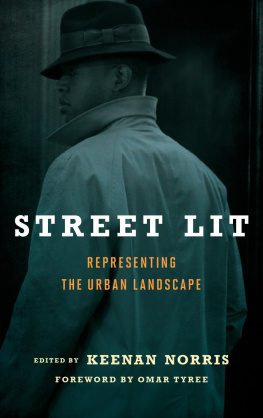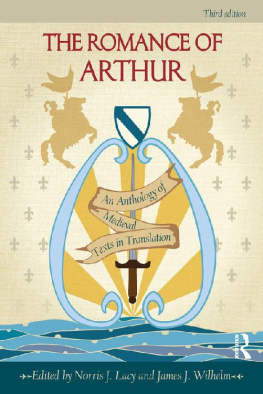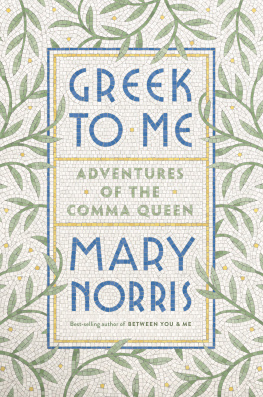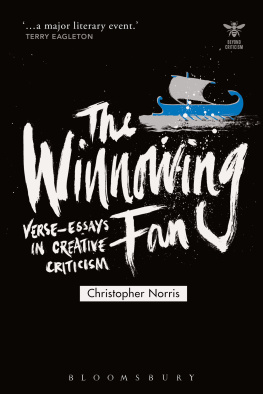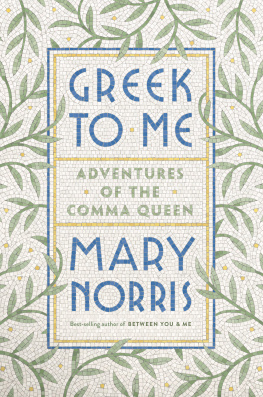THE RESPONSIBILITIES OF THE NOVELIST
And Other Literary Essays
FRANK NORRIS

This 2011 edition published by Barnes & Noble, Inc.
All rights reserved. No part of this publication may be reproduced, stored in a retrieval system, or transmitted, in any form or by any means, electronic, mechanical, photocopying, recording, or otherwise, without prior written permission from the publisher.
Barnes & Noble, Inc.
122 Fifth Avenue
New York, NY 10011
ISBN: 978-1-4114-4929-9
THE RESPONSIBILITIES OF THE NOVELIST
IT is not here a question of the "unarrived," the "unpublished"; these are the care-free irresponsibles whose hours are halcyon and whose endeavours have all the lure, all the recklessness of adventure. They are not recognized; they have made no standards for themselves, and if they play the saltimbanque and the charlatan nobody cares and nobody (except themselves) is affected.
But the writers in question are the successful ones who have made a public and to whom some ten, twenty or a hundred thousand people are pleased to listen. You may believe if you choose that the novelist, of all workers, is independentthat he can write what he pleases, and that certainly, certainly he should never "write down to his readers"that he should never consult them at all.
On the contrary, I believe it can be proved that the successful novelist should be more than all others limited in the nature and character of his work more than all others he should be careful of what he says; more than all others he should defer to his audience; more than all othersmore even than the minister and the editorhe should feel "his public" and watch his every word, testing carefully his every utterance, weighing with the most relentless precision his every statement; in a word, possess a sense of his responsibilities.
For the novel is the great expression of modern life. Each form of art has had its turn at reflecting and expressing its contemporaneous thought. Time was when the world looked to the architects of the castles and great cathedrals to truly reflect and embody its ideals. And the architectsserious, earnest menproduced such "expressions of contemporaneous thought" as the Castle of Coucy and the Church of Notre Dame. Then with other times came other customs, and the painters had their day. The men of the Renaissance trusted Angelo and Da Vinci and Velasquez to speak for them, and trusted not in vain. Next came the age of drama. Shakespeare and Marlowe found the value of x for the life and the times in which they lived. Later on contemporary life had been so modified that neither painting, architecture nor drama was the best vehicle of expression, the day of the longer poems arrived, and Pope and Dryden spoke for their fellows.
Thus the sequence. Each age speaks with its own peculiar organ, and has left the Word for us moderns to read and understand. The Castle of Coucy and the Church of Notre Dame are the spoken words of the Middle Ages. The Renaissance speaksand intelligiblyto us through the sibyls of the Sistine chapel and the Mona Lisa. "Macbeth" and "Tamerlane" rsum the whole spirit of the Elizabethan age, while the "Rape of the Lock" is a wireless message to us straight from the period of the Restoration.
Today is the day of the novel. In no other day and by no other vehicle is contemporaneous life so adequately expressed; and the critics of the twenty-second century, reviewing our times, striving to reconstruct our civilization, will look not to the painters, not to the architects nor dramatists, but to the novelists to find our idiosyncrasy.
I think this is true. I think if the matter could in any way be statisticized, the figures would bear out the assumption. There is no doubt the novel will in time "go out" of popular favour as irrevocably as the long poem has gone, and for the reason that it is no longer the right mode of expression.
It is interesting to speculate upon what will take its place. Certainly the coming civilization will revert to no former means of expressing its thought or its ideals. Possibly music will be the interpreter of the life of the twenty-first and twenty-second centuries. Possibly one may see a hint of this in the characterization of Wagner's operas as the "Music of the Future."
This, however, is parenthetical and beside the mark. Remains the fact that today is the day of the novel. By this one does not mean that the novel is merely popular. If the novel was not something more than a simple diversion, a means of whiling away a dull evening, a long railway journey, it would not, believe me, remain in favour another day.
If the novel, then, is popular, it is popular with a reason, a vital, inherent reason; that is to say, it is essential. Essentialto resume once more the propositionbecause it expresses modern life better than architecture, better than painting, better than poetry, better than music. It is as necessary to the civilization of the twentieth century as the violin is necessary to Kubelik, as the piano is necessary to Paderewski, as the plane is necessary to the carpenter, the sledge to the blacksmith, the chisel to the mason. It is an instrument, a tool, a weapon, a vehicle. It is that thing which, in the hand of man, makes him civilized and no longer savage, because it gives him a power of durable, permanent expression. So much for the novelthe instrument.
Because it is so all-powerful today, the people turn to him who wields this instrument with every degree of confidence. They expectand rightlythat results shall be commensurate with means. The unknown archer who grasps the bow of Ulysses may be expected by the multitude to send his shaft far and true. If he is not true nor strong he has no business with the bow. The people give heed to him only because he bears a great weapon. He himself knows before he shoots whether or no he is worthy.
It is all very well to jeer at the People and at the People's misunderstanding of the arts, but the fact is indisputable that no art that is not in the end understood by the People can live or ever did live a single generation. In the larger view, in the last analysis, the People pronounce the final judgment. The People, despised of the artist, hooted, caricatured and vilified, are after all, and in the main, the real seekers after Truth. Who is it, after all, whose interest is liveliest in any given work of art? It is not now a question of esthetic interestthat is, the artist's, the amateur's, the cognoscente's. It is a question of vital interest. Say what you will, Maggie Tulliverfor instanceis far more a living being for Mrs. Jones across the street than she is for your sensitive, fastidious, keenly critical artist, litterateur, or critic. The PeopleMrs. Jones and her neighbourstake the life history of these fictitious characters, these novels, to heart with a seriousness that the esthetic cult have no conception of. The cult consider them almost solely from their artistic sides. The People take them into their innermost lives. Nor do the People discriminate. Omnivorous readers as they are today, they make little distinction between Maggie Tulliver and the heroine of the last "popular novel." They do not stop to separate true from false; they do not care.
How necessary it becomes, then, for those who, by the simple art of writing, can invade the heart's heart of thousands, whose novels are received with such measureless earnestnesshow necessary it becomes for those who wield such power to use it rightfully. Is it not expedient to act fairly? Is it not in Heaven's name essential that the People hear, not a lie, but the Truth?






